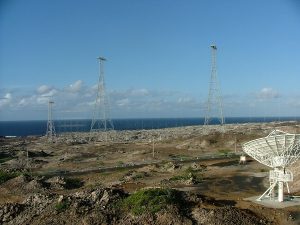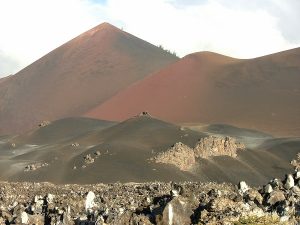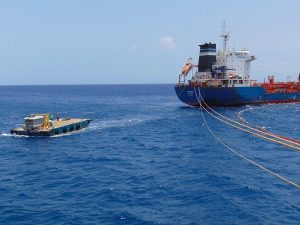On a 6-mile stretch of isolated volcanic rock located in the middle of the South Atlantic Ocean lies Ascension Island, home of the BBC’s Atlantic Relay Station serving most of Africa and South America. Though running an island may not typically be what comes to mind when you think of digital media services, Ascension Island is a key component of the BBC’s critical daily radio broadcast to more than 30 million people across the service area. With the acquisition of Babcock Media Services, Encompass Digital Media is now responsible for all of the BBC World Service’s overseas infrastructure, and that includes operating the BBC’s Atlantic Relay Station on Ascension Island.
A Brief History of Ascension Island
Originally garrisoned by the British Armed Forces in the early 1800s, the island proved to be a useful stopping-point for ships crossing the Atlantic due to its near-central location between Africa and South America. It remains a strategic communications and logistics hub for the UK and US.
During World War II, the United States military built an airbase on the island, and later expanded the runway to allow for larger aircraft. It briefly served as an emergency runway for NASA’s Space Shuttle, though thankfully it never had to be used.
In the 1960s, the BBC began searching for a location to house a relay station that would allow them to transmit shortwave radio broadcasts to Africa and South America. They selected Ascension Island and installed the Atlantic Relay Station in 1966. The station made its first shortwave radio transmission on July 3rd, 1966, just days before England won the World Cup.

The Important Role Ascension Island Plays Today
These days, Ascension Island is home to just over 800 inhabitants. Of those, a little more than 60 are employed by Encompass, and their primary function is to enable the critical radio broadcasts provided to millions of listeners a week across remote parts of Africa. The BBC’s daily African broadcasts include transmission in a number of languages, including Arabic, English, French, Hausa, Somali, Swahili and several other African languages. These radio broadcasts provide people in remote locations with vital access to the outside world and access to a free and fair press that often would not otherwise be available to them.
Operating Challenges
It takes an incredible amount of planning to find the right frequency to reach a target thousands of miles across the ocean and to ensure the BBC’s signal is the loudest on the dial. Things like atmosphere, sunspots and other broadcasters operating on the same frequencies can all adversely affect radio transmission.
One of the first questions engineers had about transmitting from a large rock in the middle of the ocean was how to get enough electricity to power the broadcast. Each transmitter needs 250kW of power to broadcast the signal across land and sea to hit the target. Their solution? Build a power station, of course! A power station using oil-fueled generators was built to produce the electricity required to run the relay station transmitters. As a by-product of their efforts, power is now also supplied to the rest of the island’s inhabitants, including conservationists and communications companies that are located on the island as well as the local government.
The second challenge engineers faced was the lack of a natural water source. In addition to providing power, engineers needed a way to provide fresh drinking water for the staff. They built a desalination plant which was later turned into a reverse osmosis plant to turn seawater into fresh drinking water for all of the island’s inhabitants. So in addition to being in the media and broadcast business, we’re now providing power and water to a number of organizations and individuals who are living on a rock in the middle of the South Atlantic Ocean!
Challenges Around Living on a Rock

The remote location of Ascension brings a set of unique challenges when it comes to sustaining life on the island. You can’t just drive to the store when you need something, because there aren’t really any stores on the island. There’s one convenience store and a couple of bars, and that’s about it.
Food
Deep sea fishing is the primary food source for the island’s inhabitants. It’s challenging to provide the people living there with meat and fresh fruit and vegetables. A UK supply ship comes to the island 6-7 times a year. Encompass purchased extra capacity on that vessel and every other month we send fresh food for the staff. The shop sells out within the first week. The Island Council also recently installed a hydroponic plant nursery to provide fresh tomatoes and lettuce.
Accessibility
Until a little over a year ago, one could jump aboard an RAF plane heading for the Falkland Islands to reach the island. On their bi-weekly route, the British military planes stopped to refuel on Ascension. However, a year ago, a crack developed in the runway, and there is now a large-scale programme being implemented to repair and resurface it.
Until the repairs are completed, regular access is limited to smaller military planes. The United States military flies in once every two weeks from Miami and the British military occasionally put on a tactical relief flight. There is also one commercial flight a month from Saint Helena (more than 800 miles or a 2-hour flight away). These few military and commercial routes are the only opportunities to get people and goods to and from the island.
Fuel

An oil storage facility houses the fuel required by the power station. The oil depot holds around 5,500-6,000 metric tons of fuel which lasts about 18 months to 2 years. Ascension’s coastline is so rocky that, in order to resupply the depot, a commercial oil tanker has to deliver oil via floating hoses offshore that connect the tanker into the oil depot. This is a particularly demanding undertaking; the 2018 delivery took over a week to complete due to the challenging sea conditions.
I Thought Encompass Was Only in the Digital Media Business?
There’s so much that goes into providing vital radio services like those that we broadcast for the BBC from Ascension, and many people don’t realize exactly what it takes. Without all of these vital resources provided, it wouldn’t happen. The 800 people living on the island are in a unique position, and they have to work together in order to survive.
The transmitter station is as important today as ever, broadcasting over 250 hours of radio every week to one of the BBC’s largest audiences in the world – all from a rock in the middle of the South Atlantic.
Encompass Digital Media is a recognized expert in radio distribution with a global network of owned and operated transmitters. If you need to help discover the best way ahead to deliver a high-value experience to your customers, give us a call.

